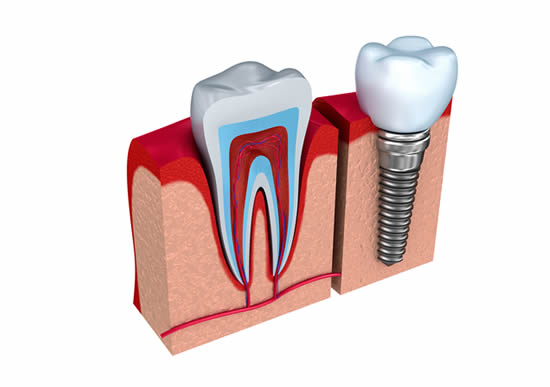Practical Advice To Assist Successful Dental Implant Placement

If you are considering having implants to replace missing teeth, here is what you need to know.
A lost adult tooth means that it is gone forever. There is no natural replacement tooth waiting to come through as they do when you lose a ‘baby tooth’. Whilst you could, feasibly, just leave a gap, most people will want to replace it, especially if the gap would be visible.
There are arguments for dentures being suitable, particularly as they typically require no surgery to have them. Many wearers though, find them to be uncomfortable and, at times, unstable. They can also be quite difficult and inconvenient to keep clean and have to be removed from the mouth to do so.
None of the above issues apply to dental implants. Once fully integrated with the bone, most people find that implants not only look like, but also feel like, a natural tooth once they have become used to them. Because the titanium ‘root’ is now firmly bonded with the bone, implants will not move around. They can also be cleaned exactly as you would your natural teeth.
The above are likely reasons that dental implants are popular. The success rate is also very high, but there are a number of things that the patient can do to help the success of their treatment.
Choose your implant dentist wisely
We have likely mentioned this in a previous blog, but it is worth reiterating. Be very cautious about opting to have your treatment abroad, especially where the price may seem cheaper than in the UK. There are many reasons why this could be the case. A positive way of looking at it is that some countries are simply cheaper to live in. However, and especially where the prices differences are significant, the reasons may be less innocent.
It can be hard to determine the qualifications of dentists in some countries and it may well be that you are signing up to have your implants placed by someone with little experience. They may also use cheaper implants which can compromise the bonding process and may lead to the implants failing. On a human level, you should also think about potential language barriers which can make communication between dentist and patient more difficult. Whilst most European dental practices should have a good level of hygiene, this may not be the case if you decide to combine your implant treatment with a long haul holiday to further flung regions of the world.
If you are considering having implants, talk to the team at the Cygnet Dental Practice about them before making any rash decisions to go abroad.
Pre-treatment planning and preparation
If you decide to have your implants placed at our Wickford dental clinic, you can be sure that any preparatory work will be carried out thoroughly. There are two key stages to this preparation.
Scans and x-rays
These are used, by our dentists, to examine the density of bone available in your jaw. It is essential that there is sufficient bone to secure the implant effectively. Whilst most people will already have this, it isn’t always the case and some patients may require a bone graft before the treatment can go ahead.
The scans are also used to determine the exact position of the implant, both to ensure that your teeth are even, and also to make sure that the nerves are not affected.
A clean and healthy mouth
Because a newly planted implant would be susceptible to infection, it is important that your teeth and gums are thoroughly cleaned by our dental hygienist to minimise the risk of any bacterial infection. Any instances of tooth decay will also need to be treated before your treatment can take place.
What you can do to help
From the dentist’s point of view; once the above has taken place, the procedure can go ahead. To improve the already high success rate of this treatment for you, there are a number of things that our Wickford patients can do to help themselves.
Once you have decided that you want to have implants, it is a good time to try to get as healthy as possible before your treatment. One thing that you will definitely have to do is to stop smoking. This is a major cause of gum disease and other infections and, if you continue to smoke whilst the implant heals, there is a real risk of failure. If you can stop for at least a period of time both before and after (and preferably forever), you will give your mouth a real health boost and enable the healing process to take place more effectively. Whilst the odd drink will not hurt too much, the same also applies to heavy and regular drinkers.
It is also a good idea to increase your fitness levels. You don’t have to ‘hit the gym’; simply walking more and climbing stairs rather that taking lifts or escalators will help. This helps to improve the blood flow, including to the area of your new implant which will speed up the healing process.
If you would like to find out more about dental implants, whether to replace a single tooth, or for multiple tooth replacement, please call the Cygnet Dental Practice on 01268 733078 and talk to one of our implant team.
